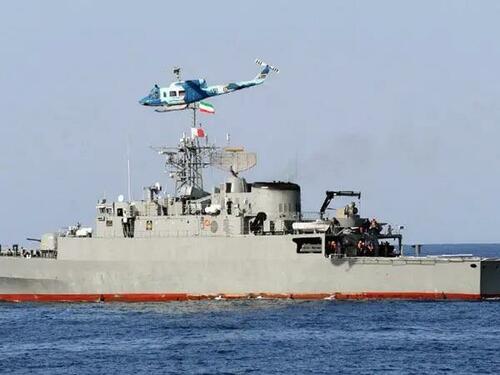Courtesy of ZeroHedge
The Houthi war on commercial shipping in the Red Sea just escalated in a big way, at least in the minds of national security officials. Western intelligence sources have issued new statements alleging that Iranian intelligence is directly assisting Yemen’s Houthi forces with targeting information, after more than two months of war in Gaza has seen some one hundred or so drones and missiles threaten both US warships and container vessels in regional waters.
“Iran’s paramilitary forces are providing real-time intelligence to Yemen’s Houthis that the rebels are using to direct drones and missiles to target ships passing through the Red Sea, Western and regional security officials said,” a Friday report in The Wall Street Journal says. This is reportedly via one or more Iranian spy ships which patrol the same waters.
“Tracking information gathered by a surveillance vessel controlled by Iran’s paramilitary forces in the Red Sea is passed to the Houthis, who have used it to attack commercial vessels passing through the Bab el-Mandeb strait in recent days, according to the officials,” according to the report.
This allegation of Tehran’s deepened involvement comes on the heels of the Biden administration having unveiled a multinational naval force to patrol and protect the Red Sea. It includes at least ten nations. This Red Sea chaos and uncertainty, which has seen several international shipping vessels struck by drones and missiles, suffering damage, has resulted in rising oil prices and insurance rates.
While weeks ago the Houthis declared they would target any Israeli-linked ship or vessel bound for Israeli ports, tankers of various flags and ownership have come under direct attack. More recently, US warships have actually been targeted too, as the WSJ in a prior report underscored:
Recently the news broke that the U.S. Navy destroyer USS Carney had fended off several missile and drone attacks in the Red Sea. While Biden administration officials tried to frame the battle, for a battle it surely was, as the Carney’s defending nearby merchant ships, it seems clear that Iranian-supplied Houthis were targeting the Carney directly as well as the commercial ships it was accompanying.
As for the new WSJ statements alleging an Iranian role, the report continues, “Many vessels sailing in the strait have been switching off their radios to avoid being tracked online, but an Iranian vessel stationed in the Red Sea is enabling the Houthi drones and missiles to accurately target the ships, the officials said.”
A Houthi statement has countered the allegations, however : “It’s strange to attribute everything to Iran as if it were the world’s strongest power,” a military spokesman said. “We have intelligence facilities that have proven themselves over the years of aggression against us.”
To a large degree, Iranian intel and weapons support to the Houthis is nothing “new” – it’s likely been happening going all the way back to 2015, when the Saudi-led coalition (which includes UAE and the US) began a large-scale bombing campaign against the Houthi rebels after they overran the capital of Sanaa. Throughout the Saud-Yemen war, Iranian missiles and drones have been recovered after being launched from Yemen.
Reports like this put US armchair hawks & Atlantic Council keyboard warriors on a war path…
This is embarrassing. There is no reason a weak power like Iran and a rag tag bunch of terrorists should be holding the global economy hostage. Hit them hard and they’ll stop. If they don’t, hit them harder. We have escalation dominance. https://t.co/RMptCBlWab
— Matthew Kroenig (@MatthewKroenig) December 21, 2023
The sourcing in the new WSJ report is interesting too, only referencing “Western and regional security officials.” This could easily simply be “American and Israeli security officials” – and really this ‘Houthis as Iran’s proxy’ is something they’ve emphasized for years.
But this moment is much more dangerous for the potential to see an eventual clash of Iranian and US forces in the Middle East. It seems we are one drone launch away from a bigger US-Houthi war, which again would have Iranian officers not so distant in the background.



